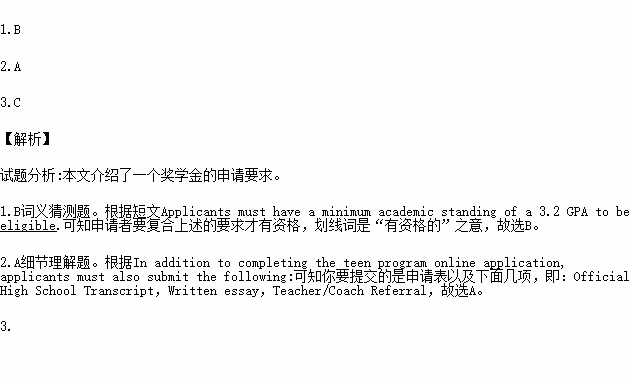题目内容
Greenheart Travel Correspondent Scholarship
Greenheart Travel offers the opportunity for high school students to broaden their perspective through studying abroad.
Greenheart Travel Correspondent Scholarship Opportunities:
US $3,000 scholarship award for a High School Study Abroad program in China
US $1,000 scholarship award for a Teen Summer Language Camp in France
US $1,000 scholarship award for a Teen Summer Language Camp in Germany
US $1,000 scholarship award for a Teen Summer Language Camp in Italy
※Applicants are only able to apply for ONE scholarship opportunity
Deadline for Application: April 1, 2015
Summary of Submission Requirements of the Scholarship:
In addition to completing the teen program online application, applicants must also submit the following:
Official High School Transcript:
Applicants must have a minimum academic standing of a 3.2 GPA to be eligible.
Teacher/Coach Referral:
Applicants must provide the name and phone number of an educator or coach that will be able to recommend the student as a good candidate for the scholarship award. Greenheart Travel will contact this referral prior to announcing the scholarship winner.
Written essay:
In a 500-to 800-word essay, please explain how this cultural exchange experience will benefit both you and your local community.
Summary of Participant Requirements:
Pre-program
Submit one blog or video 2 weeks BEFORE your program Start Date introducing yourself and why you are excited to travel on your program and what you hope to learn while abroad.
During Program
For study abroad programs: submit a written blog post and 3-5 photos or a video, once every 2 weeks by discussed deadlines.
For language camp programs: submit weekly written blog post and 3-5 photos or a video, by discussed deadline.
After Program
Submit one blog or video 2 weeks AFTER your program End Date reflecting on what you learned, your favorite part of the program and tips for anyone wanting to travel abroad.
1.The underlined word “eligible” probably means .
A. flexible B. qualified
C. energetic D. attractive
2.What should you submit when you apply for the scholarship?
a. A blog
b. Official High School Transcript.
c. A video
d. An essay
e. An application
f. Teacher/Coach Referral.
A. bdef B. abcb C. acef D. bcde
3.What do participants need to do during the program?
A. They need to write an essay about their exchange experience.
B. They need to submit a blog about their situation.
C. They need to submit 3-5 photos once a week for language camp programs.
D. They need to submit 3-5 photos once a week for study abroad programs.
 课课通课程标准思维方法与能力训练系列答案
课课通课程标准思维方法与能力训练系列答案

